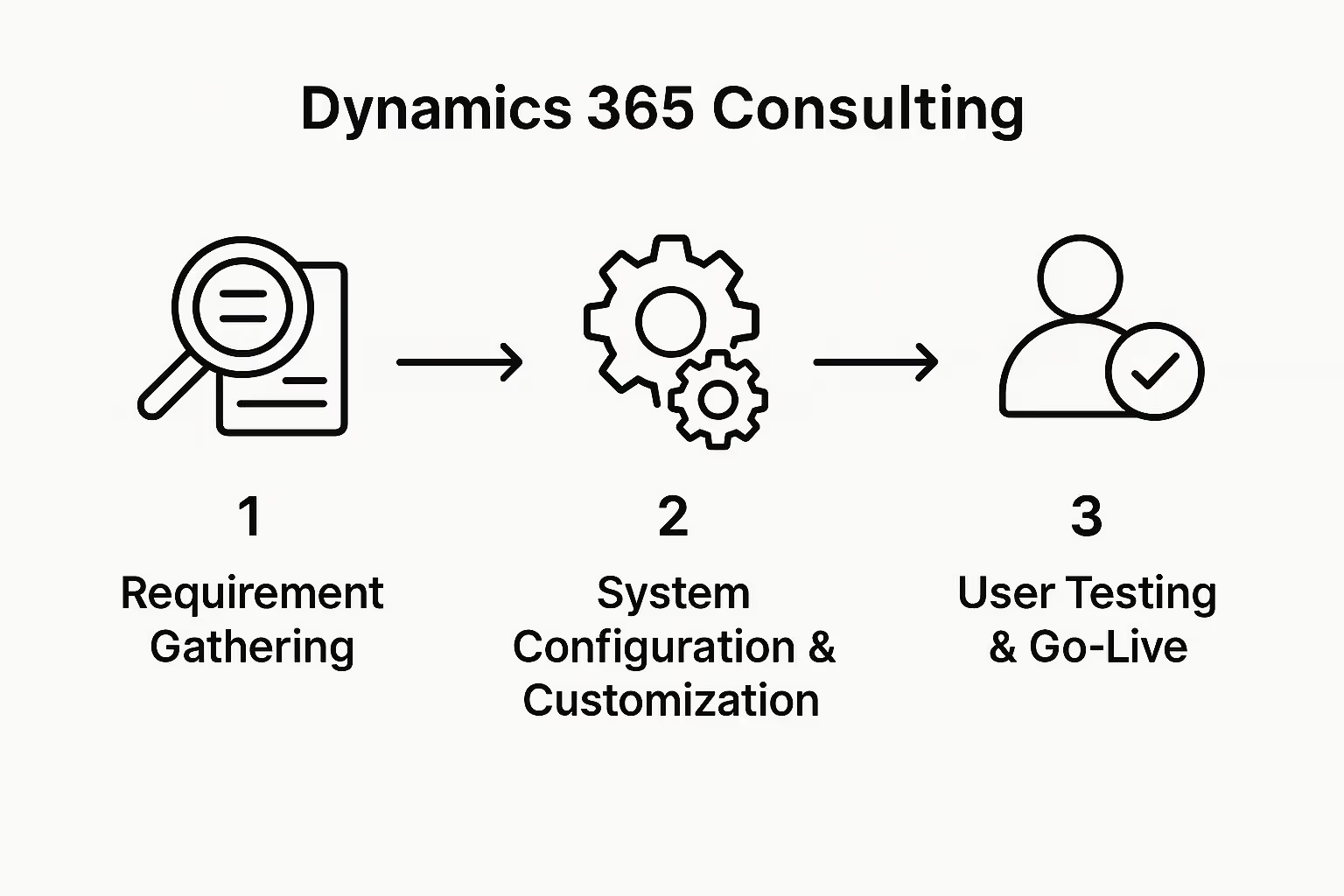Choosing to bring Microsoft Dynamics 365 into your business is a massive step forward, but the software itself is only half the battle. The real magic happens when this powerful platform is expertly shaped to solve your unique business puzzles. This is exactly where Dynamics 365 consulting services come in, acting as the critical bridge between powerful technology and real-world business results.
Why You Need a Dynamics 365 Consulting Partner

Investing in Dynamics 365 is like acquiring the components for a high-performance engine. You may have the best parts available, but you still need a master mechanic to assemble everything, tune it to perfection, and ensure it delivers peak performance. A Dynamics 365 consultant is that master mechanic for your business—the architect who designs the blueprint for your digital transformation, ensuring every module works in concert to fuel your growth.
Simply installing the software out-of-the-box often leads to underutilization, leaving significant potential untapped. Consultants go far beyond a basic setup. They act as business strategists, aligning the platform’s vast capabilities, from ERP to CRM, with your specific organizational goals.
The Architect vs. The Installer
Consider the difference between an installer and an architect. An installer follows a manual to get a system running. An architect, however, begins by deeply understanding your vision. They analyze your current workflows, identify bottlenecks, and then design a solution that not only resolves today's issues but is also scalable for tomorrow's growth.
This distinction is crucial. While your internal team might be able to get the software online, a consulting partner ensures it’s configured to:
- Optimize Core Processes: They don't just digitize outdated workflows; they re-engineer them for maximum efficiency.
- Integrate Seamlessly: They connect Dynamics 365 with your other critical systems, creating a single, unified source of truth for your data.
- Drive User Adoption: Through strategic training and change management, they ensure your team can leverage the platform effectively.
A consultant’s primary role is to translate your business needs into a technical reality. This prevents the common scenario where a company invests in a powerful platform only to use a fraction of its capabilities. Strategic implementation is what turns a software expense into a genuine competitive advantage.
The Numbers Don't Lie
The growing need for expert guidance is reflected in market trends. The global demand for Microsoft Dynamics 365 consulting services is projected to reach approximately $7.5 billion by 2025. This explosive growth stems from businesses across all sectors realizing that an expert partner is key to maximizing their investment. In fact, nearly 80% of companies implementing the platform acknowledge that professional consulting is essential to navigate its complexity.
Partnering with experts provides the deep technical knowledge required for challenging tasks like data migration and system customization. Our expert-led Dynamics 365 services are designed to help you avoid common pitfalls and set your project on the right course from the outset. By bringing in seasoned professionals, you empower your team to focus on their core responsibilities while the experts handle the technical heavy lifting, leading to a smoother and more successful rollout.
What You Really Get with Expert D365 Guidance

Engaging an expert for your Dynamics 365 consulting services elevates your project from a software installation to a true business transformation. The outcomes extend beyond a new system; they manifest as measurable improvements to your bottom line and a distinct competitive edge. It’s the difference between having a map and hiring a local guide who knows the terrain, shortcuts, and hidden obstacles.
From the start, you gain significant risk mitigation. Large-scale ERP and CRM projects are inherently complex, with potential challenges like difficult data migrations and integration issues. An experienced consultant has navigated these challenges before. They anticipate roadblocks, keeping your project on schedule and within budget.
This proactive approach saves considerable time and resources. Instead of your team learning through costly and frustrating trial and error, a consultant implements a proven methodology, ensuring the job is done right the first time.
Maximizing ROI and Getting Your Team On Board
One of the greatest challenges with any new technology is user adoption. An advanced system is a wasted investment if employees revert to old habits. This is where a consultant's change management expertise becomes invaluable.
They don't just configure the software; they help cultivate a culture that embraces it. This is achieved through:
- Custom Training Programs: They develop training tailored to each department, demonstrating how the new system simplifies specific jobs and answering the crucial "what's in it for me?" question.
- Clear Communication: They maintain open communication throughout the project, transforming initial uncertainty into genuine enthusiasm.
- User Feedback Channels: They establish mechanisms for employees to voice concerns and ideas, making them active participants in the solution.
A consultant's ultimate goal is to make the system indispensable to your team. Full user adoption is the only path to a positive ROI, ensuring the promised efficiencies are realized in daily operations.
Turning Industry Knowledge into a Competitive Weapon
A generic setup yields generic results. True value is unlocked when the solution is tailored to your industry's specific challenges and opportunities. A consultant with expertise in your vertical—be it manufacturing, retail, or professional services—can transform a standard platform into a precision tool for your business.
For a manufacturing company grappling with supply chain disruptions, an industry-savvy consultant can configure Dynamics 365 to predict inventory needs, automate reordering, and optimize production schedules. This specialized setup can directly reduce operating costs and improve delivery times.
Similarly, for a retail business, a consultant could design custom workflows to personalize customer outreach and loyalty programs, directly boosting retention and sales. This level of specialization provides a tangible competitive advantage that an out-of-the-box installation cannot offer. With the right guidance, you can more effectively streamline your business processes with Dynamics 365 in ways that are most impactful for your market.
The market growth reflects this understanding. Projections estimate the Microsoft Dynamics 365 consulting services market will reach USD 15 billion by 2025, growing at a compound annual rate of over 10%. This expansion is fueled by companies seeking expertise in cloud ERP, AI-driven insights, and custom low-code solutions. Ultimately, partnering with a consultant is not just an expense; it's an investment in getting it right.
How to Choose the Right Consulting Partner

Choosing your consulting partner is the single most critical decision you'll make on your Dynamics 365 journey. This choice will have a greater impact on your project's success than almost any other factor. An ideal partner becomes a true extension of your team, while a poor fit can lead to budget overruns, missed deadlines, and a system that fails to deliver on its promise.
The selection process is about more than comparing price quotes. You are seeking a long-term strategic ally who understands your business as deeply as they understand the technology. Think of it like hiring a general contractor for a custom home—you need proven technical skill, a solid reputation, and a communication style that inspires confidence.
To find the right fit, you need an evaluation framework that considers the complete picture, balancing technical skills with the equally critical elements of a true partnership.
Look Beyond the Microsoft Gold Partner Badge
The Microsoft Gold Partner status is a good starting point, but it's just the beginning. This certification confirms a certain level of technical competency and commitment to the Microsoft ecosystem. However, it doesn't tell the whole story.
A far more telling indicator is demonstrable industry specialization. A partner with a successful track record in your sector will understand your unique operational challenges, regulatory requirements, and key metrics from day one. This specialized experience is invaluable.
Request case studies and, more importantly, references from businesses similar to yours in size, industry, and complexity. This is the best way to verify their claims and see concrete evidence of their ability to deliver results in a relevant context.
Assess Their Project Management and Methodology
A potential partner's project management approach reveals a great deal about their professionalism and reliability. A well-defined methodology is a sign of an experienced firm that has refined its processes over time. Ask direct questions about how they manage the entire project lifecycle.
Look for a transparent and structured approach. Do they use a recognized framework like Agile or Waterfall? How do they define milestones, manage scope creep, and keep you informed of progress? A strong partner will provide clear answers and documentation outlining their process, from initial discovery to post-launch support.
The partner's project management methodology is your window into their operational discipline. A vague or unstructured plan is a major red flag that could signal a chaotic implementation. Insist on clarity, accountability, and a predictable framework.
Additionally, inquire about their change management strategy. Successful implementation hinges on user adoption. A competent consultant will have a concrete plan to guide your team through the transition, including targeted training, clear communication, and support systems to ensure your employees embrace the new platform.
Cultural Fit and Communication are Non-Negotiable
Technical skills can get a project started, but cultural fit and strong communication are what ensure its successful completion. Your consulting partner will work closely with your team for months; a personality clash or communication breakdown can easily derail progress.
During interviews, pay close attention to the dynamic. Are they active listeners? Do they ask insightful questions about your business goals, or do they focus solely on technology? The best dynamics 365 consulting services are delivered by partners who prioritize your vision.
Consider their communication style. Do they prefer formal weekly reports or quick daily stand-ups? Neither approach is inherently wrong, but one will align better with your company's culture. Finding a partner whose communication style meshes with your team's is essential for building the trust required for a successful long-term relationship. You are looking for a team that feels like a natural extension of your own.
To help you systematically evaluate your options, use the following checklist to score potential partners on the criteria that matter most.
Consulting Partner Evaluation Checklist
Evaluation CriteriaKey Questions to AskWhy It MattersIndustry Specialization- Do you have experience in our industry (e.g., manufacturing, retail)?- Can you provide case studies or references from similar companies?An industry-savvy partner understands your unique challenges and terminology, reducing ramp-up time and ensuring the solution fits your specific needs.Technical Expertise- What Microsoft certifications do your consultants hold?- How do you stay updated on new Dynamics 365 features?Verifies their technical foundation and commitment to continuous learning in a rapidly evolving platform.Project Methodology- What project management framework do you use (Agile, Waterfall, Hybrid)?- How do you manage scope, budget, and timelines?A clear methodology indicates a predictable, organized process, which minimizes risks of delays and cost overruns.Change Management- What is your approach to user training and adoption?- How do you support our team after the go-live?Technology is only effective if people use it. A strong change management plan is crucial for ROI.Communication Style- What is your standard communication cadence (daily, weekly reports)?- Who will be our primary point of contact?Aligns expectations and ensures a smooth flow of information, preventing misunderstandings and building trust.Cultural Fit- How would you describe your team's working style?- How do you handle disagreements or project challenges?You're building a long-term relationship. A good cultural fit ensures collaborative problem-solving rather than confrontational stand-offs.
Using a structured checklist like this transforms your decision from a "gut feeling" to a data-driven choice, ensuring you select a partner truly equipped for your success.
Your Dynamics 365 Implementation Roadmap
A successful Dynamics 365 implementation is not a chaotic scramble; it's a carefully orchestrated journey. Much like building a custom home requires a detailed blueprint, a successful software rollout needs a clear roadmap. Guided by expert Dynamics 365 consulting services, this roadmap breaks a massive project into manageable, logical phases.
This structured path ensures every stakeholder understands their role, every milestone is clearly defined, and the project advances with purpose. By understanding this lifecycle, you can set realistic expectations, manage internal communications, and keep the project on track and on budget, turning a potentially overwhelming task into a predictable process.
This process flow illustrates the three core stages of implementation.

Each phase builds upon the last, moving from requirements gathering to the delivery of a fully tested and operational system.
Phase 1: Discovery and Planning
This initial phase is arguably the most critical. Here, your consulting partner acts as a business analyst, diving deep into your company's current operations. They seek to understand not just what you want the software to do, but why. The objective is to map your business processes, identify pain points, and define what success will look like for your organization.
Key activities during this stage include:
- Stakeholder Workshops: Bringing together key users from various departments to understand their daily challenges and requirements.
- Business Process Mapping: Documenting current workflows to identify inefficiencies and opportunities for improvement.
- Defining Scope and Objectives: Creating a detailed project scope document that outlines specific goals, deliverables, and key performance indicators (KPIs).
This stage is about measurement and alignment. A project without clearly defined goals and a deep understanding of current processes is destined for scope creep and budget overruns. A solid discovery phase ensures everyone is working toward the same vision.
Phase 2: Design and Configuration
With a clear blueprint from the discovery phase, the technical work begins. Your consultant translates your business requirements into a functional system, configuring standard Dynamics 365 modules and, when necessary, designing custom solutions to address your unique operational needs.
This phase involves a collaborative design process where your team provides feedback on proposed solutions to ensure they align with real-world workflows. It is also when complex tasks like data migration planning occur, ensuring your historical data is cleansed, mapped, and prepared for its new environment. For a deeper dive, explore our complete guide on Microsoft Dynamics 365 implementation.
Phase 3: Testing and Go-Live
Before a system-wide rollout, the platform undergoes rigorous testing. User Acceptance Testing (UAT) is a crucial step where a select group of employees tests the system against real-world scenarios to confirm it functions as expected. This feedback loop is vital for identifying issues before the final launch.
Once UAT is complete and final adjustments are made, it’s time for the "go-live" event—the carefully planned transition to the new Dynamics 365 environment. However, the work doesn't end here. Post-launch support is essential for a smooth transition, helping users navigate the new system and resolve any initial issues promptly. This continued partnership is key to driving user adoption and securing the long-term value of the project.
The increasing complexity of these platforms is driving significant market growth. As of 2024, the Microsoft Dynamics 365 consulting service market is valued at approximately USD 3.1 billion and is projected to nearly triple to about USD 9.85 billion by 2033. This growth is fueled by companies seeking expert help to integrate, automate, and analyze their operations effectively. To understand more about these market trends, you can discover more insights on Business Research Insights.
Driving Long-Term Value After Go-Live
Launching your Dynamics 365 platform isn't the finish line—it's the starting point. The true value of your investment emerges in the following months and years as the system evolves from a new tool into the central nervous system of your business. This is where ongoing dynamics 365 consulting services transition from a one-time project to a continuous strategic partnership.
Deploying the software and disengaging is a recipe for stagnation. Your business will change, new market challenges will arise, and Microsoft will continue to release powerful new features. A dedicated partner ensures your D365 solution adapts and grows with you, preventing it from becoming an outdated digital relic.
Fostering a Culture of Continuous Improvement
The post-launch phase focuses on optimization and evolution. Your consulting partner helps you move beyond basic functions to achieve strategic mastery. They analyze real-world usage data to identify where workflows can be streamlined and where your team may need additional support to unlock the platform’s full potential.
This commitment to continuous improvement involves several key activities:
- Performance Monitoring: Proactively identifying and resolving system bottlenecks to maintain optimal performance and reliability.
- Targeted User Training: Offering advanced training on specific features that can significantly boost a department's productivity.
- Strategic Feature Adoption: Guiding you on which new Microsoft updates—such as AI-powered analytics or Copilot integrations—will deliver a meaningful business impact.
Effective user adoption is a continuous process, not a one-time event. To learn more, check out these top 15 tips to increase CRM user adoption and keep your team engaged long after the initial rollout.
From Maintenance to Strategic Guidance
As your team becomes proficient with the system, the nature of support you require from your consulting partner evolves. It shifts from reactive troubleshooting to proactive strategic advice. A top-tier consultant doesn't wait for you to report a problem; they are already anticipating your future needs.
Your post-launch partnership should focus on one question: "What's next?" A great consultant helps you answer that by aligning the Dynamics 365 roadmap with your long-term business goals, ensuring your technology always stays a step ahead of the competition.
They serve as your connection to the entire Microsoft ecosystem, helping you understand and leverage new innovations. For example, they might suggest building a Power App to address a niche operational challenge or integrating a new AI module to uncover predictive customer insights. This is how your D365 platform transforms from a static operational tool into a dynamic asset that actively drives growth and innovation—the ultimate goal of any successful digital transformation.
Getting Your Business Ready for What's Next with D365
Technology that only solves today's problems is already behind schedule. To maintain a competitive edge, your business systems must be prepared for future opportunities. The Dynamics 365 ecosystem is constantly evolving, and staying current with major trends is essential. This is where an astute Dynamics 365 consulting service proves its value, acting as your guide to what's on the horizon.
The most significant game-changer today is generative AI, prominently featured through Microsoft Copilot. This is not merely a new feature; it represents a fundamental shift in how your teams will interact with business data. Think of Copilot as an intelligent assistant embedded within your daily ERP and CRM screens.
For example, a salesperson can ask Copilot to summarize recent client communications and then draft a follow-up email, all without leaving Dynamics 365. This intelligent automation removes repetitive tasks from your team's workload, freeing them to focus on strategic, high-value work that requires human ingenuity.
Leaning into AI and Industry-Specific Clouds
Simply enabling AI is not a strategy. An effective consultant helps you leverage these powerful tools to generate true predictive insights. They can configure your system to forecast sales with greater accuracy or identify at-risk customers before they churn. Suddenly, your data transitions from a historical record to a predictive tool.
The future of business software is proactive, not reactive. Consultants help you use AI to anticipate needs and automate responses, creating a more agile and intelligent operation that can adapt to market shifts in real time.
Another significant trend is the rise of industry-specific cloud solutions. Microsoft now offers pre-configured versions of Dynamics 365 tailored for sectors like retail, healthcare, and manufacturing. These solutions are not blank slates; they come with built-in workflows, data models, and reports designed to address the unique challenges and regulations of that industry.
The Power of Low-Code Development
Finally, the Power Platform—comprising Power BI, Power Apps, and Power Automate—is becoming the engine that drives much of the Dynamics 365 experience. This suite empowers your own team to build custom applications and automate processes without extensive coding knowledge. A consulting partner can train your staff to use these tools to:
- Build Custom Apps: Create simple mobile apps for field technicians or internal tools to solve unique departmental problems in a fraction of the usual development time.
- Automate Workflows: Connect Dynamics 365 with hundreds of other applications to automate everything from data entry to complex approval processes.
This low-code capability provides the agility to respond quickly to new challenges and opportunities. By embracing these trends, you ensure your Dynamics 365 platform is not just a system you use, but a launchpad for continuous innovation.
Frequently Asked Questions
When considering enterprise software, numerous questions naturally arise. Here, we address some of the most common inquiries about Dynamics 365 consulting services.
How Long Does a Typical Dynamics 365 Implementation Take?
There is no single answer, as the timeline is determined by project complexity. A straightforward, out-of-the-box implementation for a small business might take 3-6 months.
However, a large enterprise requiring multiple modules, extensive data migration, and significant customization could be looking at a timeline of 12-18 months or more. A good partner will begin with a thorough discovery phase to provide a realistic schedule tailored to your business needs.
What Is the Cost Structure for These Services?
Consulting costs generally fall into one of three models, offering flexibility based on your project's requirements.
- Time & Materials (T&M): You are billed at an hourly or daily rate for time spent. This model is ideal for projects where the scope may evolve.
- Fixed-Fee: A set price is agreed upon for a clearly defined scope of work. This provides budget certainty and is best suited for projects with well-defined goals.
- Retainer Model: A recurring fee covers ongoing support, system enhancements, and strategic advice after the initial implementation is complete.
Most firms will discuss these options to determine a pricing structure that is transparent and aligned with your objectives.
The right pricing model aligns the consultant's work with your project's goals. Whether you need flexibility for an evolving scope or the predictability of a fixed budget, a good partner will accommodate your needs.
Can We Handle Implementation Without a Consultant?
While technically possible with a highly experienced in-house IT team that specializes in Dynamics 365, it is generally not advisable. The platform is complex, and consultants bring extensive experience from numerous projects.
They understand best practices and, more importantly, are aware of common pitfalls that can lead to budget overruns and low user adoption. To better understand the platform's components, review our deep dive into what is Dynamics 365. Partnering with a consultant is the most effective way to mitigate risk and ensure your project delivers the expected ROI.
At Twelverays, we specialize in turning your Dynamics 365 investment into a powerful engine for business growth. Our expert consulting services ensure your platform is perfectly aligned with your strategic goals, delivering measurable results from day one. Let's build your success story together.





